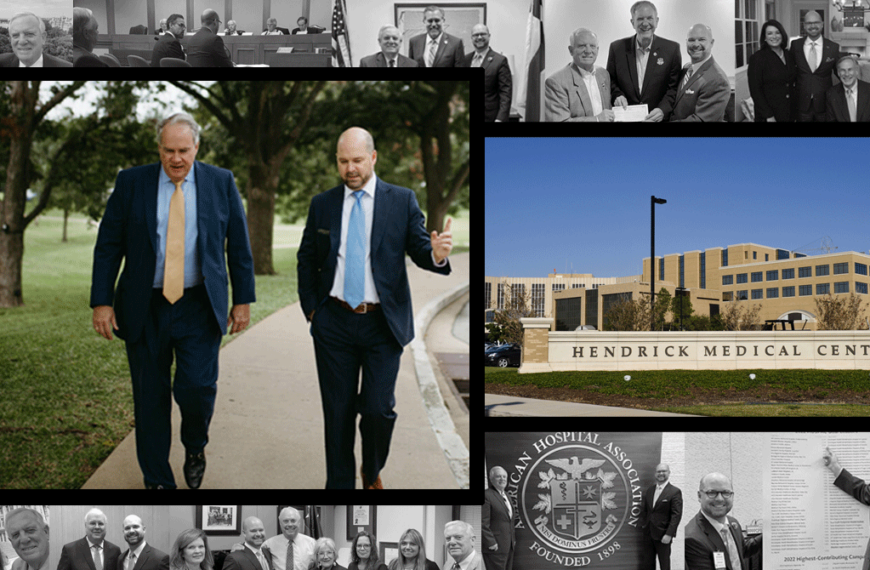Hospitals and their advocates, including the Texas Hospital Association, now have their eyes on November to see where federal policy affecting their facilities goes from here.
Right after U.S. voters go to the polls to choose their next president – as well as the holders of many congressional seats – the most key outstanding issues affecting hospitals will again be on the table for congressional debate. Site-neutral payment policies, pending cuts in the Medicaid Disproportionate Share Hospital (DSH) program, the future of telehealth and more will all be potential fodder for the so-called “lame-duck” session, the often-frenetic race to pass key legislative items between the election and the end of the calendar year.
The results of November’s election will be key – to a point. Will President Joe Biden win another four years, or will Donald Trump become the second president ever to serve non-consecutive terms? What will be the party makeup of each chamber in the new Congress starting in 2025?
Those questions will help shape the winds propelling hospital-relevant policy in the lame-duck, although Cameron Krier Massey, J.D., MPH, a federal lobbyist for THA, notes that some of the topics THA, the American Hospital Association and other hospital advocates are tracking have generated bipartisan policy agreement.
“If there are significant changes in the House or Senate, or if we have a new President, Congress may only provide a short-term extension of expiring programs that carries them into 2025,” Massey said. “A longer-term package could take shape after new leadership has some time to set their priorities.”
“But, for the most part, our policy issues have significant bipartisan engagement, so the election results may not have a substantial impact on our priorities. Medicaid DSH, rural hospital funding and telehealth have strong bipartisan support, and unfortunately, site-neutral policies are favored by some Republicans and Democrats.”
However the election shakes out, the following key issues are on THA’s radar to become either potential part of legislative activity in the lame-duck and/or a longer-term concern.
Site-neutral payment policies – Staunch THA and American Hospital Association advocacy against site-neutral payment policies helped slow the advance of proposals that would have instituted them for drug administration services in off-campus hospital outpatient departments (HOPDs), despite that the House passed site-neutral for HOPDs as part of the Lower Costs, More Transparency Act late in 2023. The Senate hasn’t taken up that sweeping bill.
Site-neutral policies mandate that payment rates for care remain at the lowest rate available regardless of the setting for that care. Hospital advocates strongly oppose any expansion of those policies, noting hospitals generally treat sicker patients and more complex cases than other settings like independent physician offices and also face a higher regulatory burden.
When it comes to drug administration at HOPDs, the concern on site-neutral payments isn’t solely the impact of the payment cuts that would result for those services, Massey notes, but the danger of a snowball effect in which Congress begins broad implementation of site-neutral across a greater swath of hospital services.
Medicaid DSH cuts – When President Biden signed a package of bills in March to fund the federal government through the end of federal fiscal year (FY) 2024, it finalized a long-sought repeal of DSH cuts for this fiscal year – saving Texas safety-net hospitals $800 million in reductions.
That was a huge victory for hospital advocates – but it’s only a quarter of the journey for THA and their partners in that pursuit. After a delay was also built into the government funding package, cuts for federal fiscal year 2025 are pushed out until Jan. 1 – but if they come to pass, it will kick off three remaining fiscal years of cuts and a hit of more than $2 billion hit to Texas’ safety net.
THA will once again stress the detrimental impact of these remaining cuts, and push for a repeal (or delay) to be included in an end-of-year package.
Telehealth flexibilities and hospital-at-home – The COVID-19 public health emergency necessitated federal relaxations on relatively stringent regulations on when and how providers can use telehealth. It also prompted the formation of what became the Centers for Medicare & Medicaid Services’ Acute Hospital Care at Home program, allowing facilities to control surges of the virus by treating eligible patients at home.
Both these facets of the COVID-19 response – such as lessened geographical-location restrictions on patient-provider connections in telehealth – proved to have valuable permanent utility for hospitals, and a 2022 end-of-year funding package extended them through the end of 2024. Hospitals will seek to make both the telehealth waivers and hospital-at-home permanent.
Many telehealth flexibilities would become permanently enshrined in law under the CONNECT for Health Act, for which AHA has recently registered its support.
“The biggest concern with making them permanent is fraud,” Massey said. “So you see some members [of Congress] that are very vocal and very concerned about oversight of those flexibilities. But I think generally, there’s broad support for the value of those flexibilities and how they’ve improved access to care.”
Extending rural payment programs – As part of the funding package signed in March, two programs that are a key payment lifeline for certain rural hospitals – the Medicare-Dependent Hospital (MDH) and the Low-Volume Adjustment (LVA) programs – were extended through the end of the year. MDH provides payments to facilities that serve a particularly high proportion of Medicare payments, while LVA issues add-on payments to facilities that meet certain requirements, including falling below a threshold number of discharges. THA will again ask for continuation of these programs.
340B Drug Pricing Program transparency – THA and AHA and other hospital advocates oppose any new reporting burdens for an industry that already has plenty of them. Nonetheless, the 340B program – which requires Medicaid-participating pharmaceutical-makers to sell outpatient drugs at a discount to organizations that serve low-income and uninsured patients – has been a longtime target for increased reporting and oversight. Some lawmakers have been considering requiring facilities to report how they reinvest savings they’ve realized from the reduced drug prices in 340B.
Site-neutral payments – and many if not all of these other issues – are likely to be part of negotiations for an end-of-year package that Massey predicts will be “a complete Christmas tree,” jargon for legislation on which hangs a ton of weighty policy matters.
“That’s where we’re going to see these rural health extenders. That’s where we‘re going to see telehealth,” she said. “That may be where we see more Medicaid DSH. There’s going to be a lot of spending items in that package, and they’re going to be looking for [cost] offsets. I would really be surprised if site-neutral doesn’t come in there.”
[Below is the previous update, originally published Sept. 5, 2023.]
This month, hospital advocates and Congress face a tense environment and a tight window.
Next week, lawmakers return to Washington, D.C. from their August work period – a period of about a month and a half in which members of the House of Representatives return to their districts, talk with constituents and get the lay of the land back home.
When members of the Texas congressional delegation return to D.C., they’ll quickly receive a welcome-back from the Texas Hospital Association. THA will send members of its advocacy team to Washington in mid-September to meet with lawmakers and their staffs about pending proposals that would harm hospitals, including payment cuts and onerous reporting burdens.
For THA, building the coalitions on these issues among Texas lawmakers will be paramount. But much like what THA faced in this year’s state legislative session, the environment won’t be an easy navigable one.
“The degree of scrutiny that I feel like hospitals are under right now, and over this last year, is something that I really haven’t seen in a while,” said Cameron Krier Massey, JD, MPH, a federal lobbyist for THA. “It is the reason for very focused engagement and advocacy – not just from THA, but also from our member hospitals to their elected officials.”
Time will also be a factor, Massey notes: the House will be in session for just 12 days in September before the federal fiscal year begins on Oct. 1. And from there, the House will be in session for just 36 days before the end of the year.
Here’s a look at some of the key issues THA will be engaged on as Congress returns.
Site-neutral payment cuts
THA, the American Hospital Association and other hospital advocates will be in full gear attempting to stop proposed cuts involving the expansion of site-neutral payment policies, including measures that already passed out of the House Energy & Commerce (E&C) and Ways & Means committees.
The concept behind “site-neutral” payments is just as it sounds: Whether receiving their care in a hospital outpatient department or in a physician’s office, patients would pay the lowest amount for that care.
THA and AHA have noted repeatedly that the higher costs associated with hospital outpatient visits are warranted and necessary: Hospitals generally treat sicker patients than physician outpatient settings do, and are subject to a much higher regulatory burden, along with more stringent licensing and accreditation standards. Site-neutral policies, and the cuts they bring for hospitals, slice into those facilities’ ability to care for patients – in a Medicare setting that already pays below cost.
Nonetheless, proposals to expand site-neutral payment structures – in this case, for drug administration services – have gained momentum in D.C. in recent months. The one that passed out of the Energy & Commerce Committee in May would institute site-neutral payments for drug administration services in previously grandfathered hospital outpatient settings – facilities that were carved out of previous site-neutral laws. For those hospital outpatient departments, a four-year phase-in would begin in 2025.
An AHA analysis of that proposal estimated a $54.2 million cut for hospitals in the first year alone, and a $3 billion reduction over 10 years. The AHA-estimated impact for Texas would be $1.4 million in year one and $74.5 million over 10 years.
Brad Holland, president/CEO of Hendrick Health in Abilene and chair-elect of THA’s Board of Trustees, notes that with the payment cuts that would accompany site-neutral expansion, hospitals don’t have the ability to pass increased costs on to their customers. Holland noted recent data from the THA-commissioned Kaufman Hall report, which showed nearly half of all Texas hospitals were in the red in 2022.
“If I make Hershey’s chocolate, and my cost of cocoa beans went up, I would just charge more for my Hershey’s chocolate bar,” he said. “In hospitals, we don’t have the luxury of doing that, because [with] Medicare, Medicaid, no-pays and the commercial payers, we get what we get.
“Because the inflationary costs over the last two years, three years, since the pandemic … are probably up 25% over those three years. And reimbursement from the government, or payers, is only up [by] single digits.”
Holland said the site-neutral concept “sounds like a great talking point” but would be catastrophic in practice.
“People think that it helps Medicare recipients and the payers … and their belief is it helps everybody,” he said. “But I believe that it’s an anti-hospital [concept]. The unintended consequence will devastate the hospital industry.”
The recent site-neutral proposals apply to drug administration services, but the impact hospitals fear goes well beyond what those bills themselves would bring.
“The concern is that Congress will move on to more expansive policies in the future,” Massey said. “E&C considered three different site-neutral policies. This one [that the committee passed] had the lowest financial impact. There were others that go all the way up to a $9 billion cut for Texas over a 10-year window.
“What is so concerning is the general trend or the direction that we may head in on site-neutral broadly. They’re just starting with drug administration services.”
Medicaid: DSH cuts and state payment programs
After Congress reconvenes, lawmakers will have the quickest of turnarounds in which to heed hospitals’ warnings on Medicaid disproportionate share hospital (DSH) payment cuts. If Congress doesn’t take action by Oct. 1, $16 billion worth of cuts will go into effect across fiscal years 2024 and 2025 – a vicious blow to safety net funding both in Texas and nationwide.
Back in April, Rep. Yvette D. Clarke (D-N.Y.) introduced the Supporting Safety Net Hospitals Act with two original cosponsors from the Texas delegation: Reps. Dan Crenshaw (R-Houston) and Michael Burgess, MD (R-Lewisville). Supported by both THA and AHA, the bill would repeal the $16 billion in cuts over the next two fiscal years.
Hospital voices will resume advocating for that legislation and any other steps to stave off or eliminate DSH cuts, and THA will continue efforts to build support from the rest of the Texas delegation.
THA will also be talking to lawmakers about the impact of a proposed rule by the Centers for Medicare & Medicaid Service (CMS) that would limit Texas’ and other states’ ability to draw down federal funds for their Medicaid programs. The CMS proposal, put forth in May, would give CMS broad authority to withhold or retroactively deny state-directed payment programs (SDPs) if the agency believes the program is financed with impermissible non-federal funds. It would also require hospitals participating in SDPs to attest in writing to not participating in “hold harmless” arrangements, or arrangements in which hospitals are reimbursed all or part of taxes they paid.
THA believes the rule is an overreach and that it would “accelerate Texas hospital closures, reduce service lines like OB-GYN, pediatrics, and behavioral health, limit access to care for low-income Texans, and leave the State of Texas holding the bag on an even larger financial Medicaid burden.”
Medicare 340B drug pricing
THA will also be engaged in discussions surrounding Medicare 340B, a key program that requires drug manufacturers participating in Medicaid to sell outpatient drugs at discounts to organizations that serve low-income patients and the uninsured. Pharmaceutical makers have pushed members of Congress to increase reporting and oversight on 340B, and have found some lawmakers willing to back such measures.
“Some of the things that are being considered now are additional reporting by 340B providers on how they are using those savings [and] how much charity care they’re providing,” Massey said. “Texas is in a little bit of a unique place on that issue specifically, because we have a pretty robust state law that requires reporting of charity care. So when we’ve talked with some of the delegation offices, we’ve actually shared how Texas could be a model for some of those federal reforms.
“But there is growing interest from both sides – Republicans, Democrats, House, Senate – on greater transparency in the program. Having hospitals report publicly how they’re reinvesting those savings is one of the ways that they are looking at doing that.”
Like AHA, THA is opposed to adding to the long list of mandates – reporting and otherwise – that hospitals already face and strongly supports the continuation of 340B, which allows hospitals to use the discounts on life-saving drugs and expand access to care.
Related articles from The Scope
Brad Holland: Rallying for Texas Hospitals
One year ago, THA was launching into the 2023 legislative session, ready to advocate for Texas hospitals with the pandemic receding further in the rearview mirror. While we knew the…
Hospitals Squelch Looming Trouble in COVID, Immigration Bills
Like most people, we were hoping it was all over. But once again, we rose to make our case – and protected Texas hospitals and health care. John Hawkins Months…
2023 Wrapped on The Scope
As we approach the end of the year, we’re looking back at some of the high points of 2023. Despite the inevitable uphill battles during a session year, we are…
Show and Tell: Hosting a Lawmaker at Your Hospital
It’s one thing to tell a lawmaker what your hospital – and others – need from policymakers in order to thrive. It’s another thing entirely to show them. While getting…



